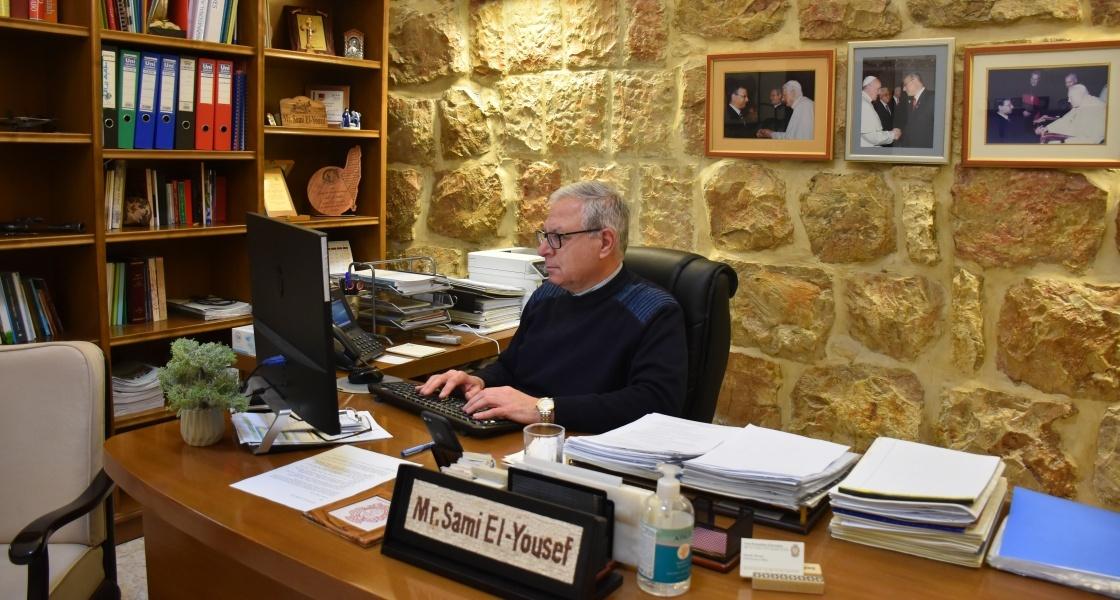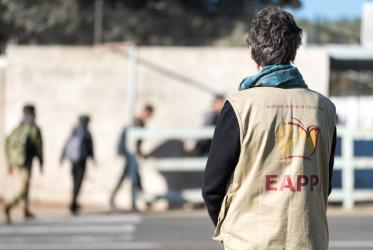In the Orthodox tradition, the Holy Fire ceremony occurs on the Saturday before Easter, when a flame is taken from the marble slab covering the stone bed upon which Jesus’ body is believed to have been placed for burial. Thousands of pilgrims as well as local Christians gather for the ceremony and for the procession preceding it.
“When the names of these families are called, right before the procession starts, there is the indication of the impact of a long history here, the sense of generation after generation,” said El-Yousef.
But six of the 13 families no longer live in Jerusalem to carry their banner. “Some show up every few years,” El-Yousef explained, “then they disappear for another 10 or 15 years.”
El-Yousef worries about the day when those families are no longer there at all. “Unless there is a dramatic change in the political situation, undoubtedly the Christian faith will continue to suffer in the origins of Christianity,” he said.
El-Yousef lives this painful reality both professionally and personally. The chief executive officer of the Latin Patriarchate of Jerusalem, he lives and works in the New Gate neighborhood, where his family has lived for hundreds of years.
“Many of my coworkers also live in the Christian quarter of the Old City,” he said. “They’ve been there for generations.”
There are days when it seems the character of the Christian Quarter has been preserved. “You wake up listening to church bells and you go to sleep listening to church bells again,” El-Yousef reflected.
But he also sees changes in recent years that he believes are threatening to tear the social and sacred fabric of the Christian quarter. “You no longer feel you actually belong there,” he said. “You start to feel a little alienated when your culture and your religion is not represented.”
El-Yousef believes Jerusalem should be the most beautiful city on earth. Particularly this year, when high holidays for Muslims and Jews—Ramadan and Pessach—are also being observed at the same time period, Jerusalem should be a city that is celebrating.
“Ideally people would be allowed to go in their own direction to their own worship,” said El-Yousef. “Thus the sharing happens—and when it doesn’t, it’s an ugly thing.”
When Jerusalem is not respected as a holy space, that’s when violence, hate and injustice erupt. “My hope continues to be that likeminded people—people willing to live in peace—will overrule,” said El-Yousef. “The space needs to be respected.”
People who visit Jerusalem are not exposed to injustices experienced by those who live there, he added. “You’re here as a pilgrim, you go to holy places, and you leave with a good experience,” he said.
What needs to happen to achieve peace in this holy city? “Really, it’s to go back to the basics, meaning that every person’s life is precious, every human life is equal,” he said. “If we see each other as human beings, 99 percent of our problems will vanish.”
In order for everyone to be treated equally, barricades—both physical and internal—need to be dismantled, El-Yousef urged.
“We need to live in freedom and dignity regardless of our background,” he said. “Without alienating a certain religion or a certain people, we need to insist these spaces are respected.”
As Easter approaches, El-Yousef is able to express his appreciation for his community. “During Holy Week, Jerusalem is the best place to be,” he said. “The city comes to life.”
He has fond memories of tens of thousands of people peacefully participating in the holy procession, speaking many different languages.
Many people want to be close to the Church of the Holy Sepulchre during the Holy Fire ceremony, said El-Yousef, but every year, fewer and fewer people seem to have access.
“Some reasons given for these restrictions appear to be safety-related,” he said—yet the same restrictions are not applied to people of other faith communities.
“That again becomes very alienating,” he said.
Yet Jerusalem is a magical place, El-Yousef concluded. “People renew their faith,” he said. “If we do it right, maybe as time goes on, we can open the eyes of those who left this land, and have them turn, come back, and be part of it all.”







